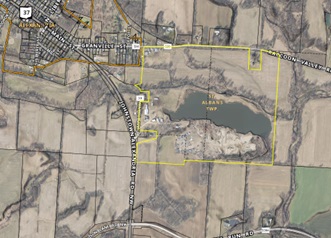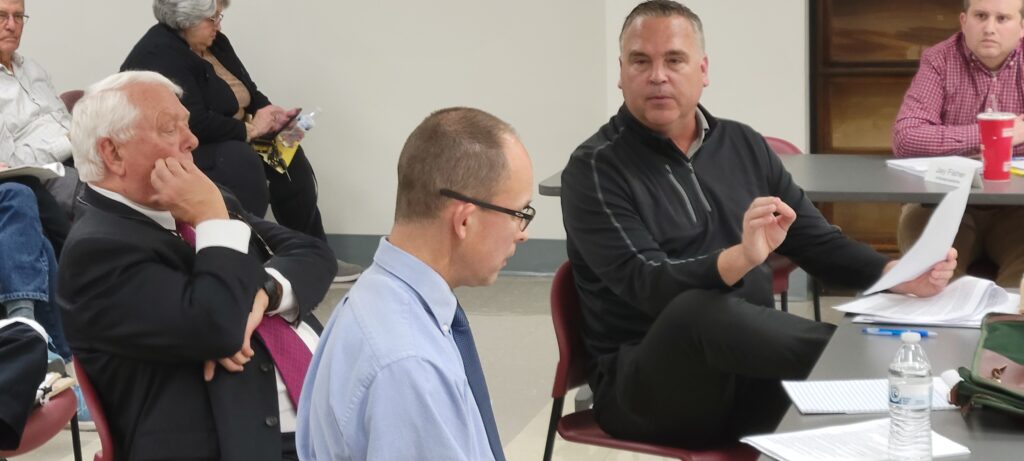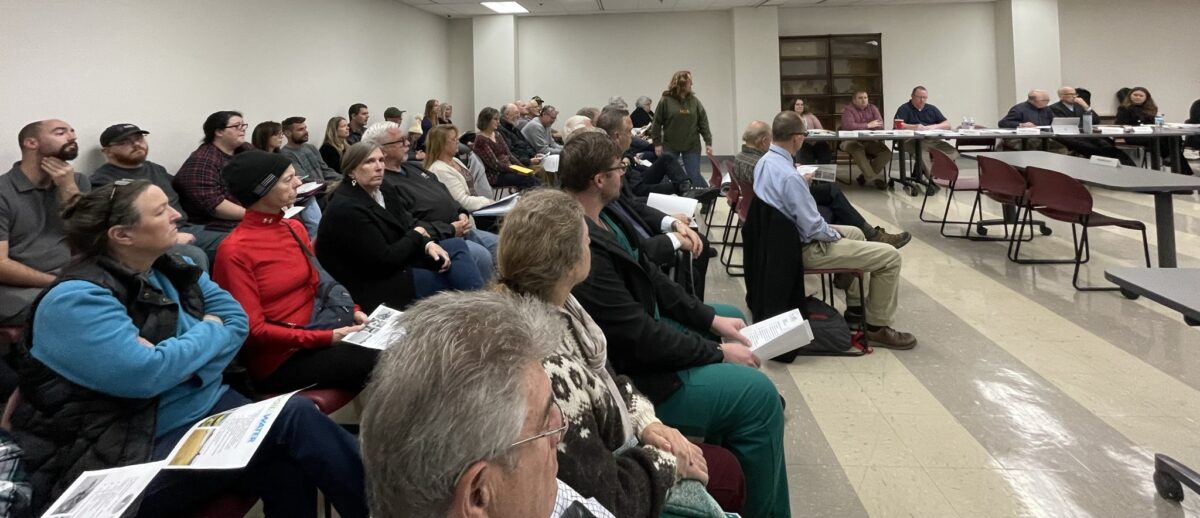Minutes from the end of a meeting that had dragged across nearly four hours and two intermissions, most folks in the packed room finally heard the Licking County Planning Commission roll-call vote they had come to witness.
The commission members voted unanimously to reject an appeal by Shelly Materials and Scioto Materials, affiliates of The Shelly Company, for a permit for development of a site near Alexandria where the company would like to operate concrete- and asphalt-mixing facilities.
Nearly 70 people who filled the basement meeting hall before the start of the 7 p.m. meeting on Nov. 20 – most from Alexandria, St. Albans Township, Granville and Granville Township – erupted in cheers and applause after 10:30 p.m. when the roll-call vote was completed.
“Thank you, planning commission!” someone in the audience shouted over the applause.
“That was worth the wait,” said Granville Mayor Melissa Hartfield, who was among the Granville-area residents who spoke to the commission during the “public comment” period early in the meeting at the Donald D. Hill County Administration Building in downtown Newark.
One after another, residents of the villages and townships pleaded with the commission to reject the appeal by The Shelly Company, whose affiliates had applied for a permit for development activities in the Raccoon Creek flood plain. The planning commission denied that permit in June, saying that the company’s proposed construction would not be permitted in the floodplain under Federal Emergency Management Agency rules.

“You made the right decision the first time by denying this permit,” Hartfield said early in the meeting. She has joined residents of the villages and townships in speaking out during the past year as three different companies proposed two asphalt plants and three concrete-mixing plants near Raccoon Creek and the village of Alexandria.
Granville draws its drinking water from wells in an aquifer that is recharged in part by Raccoon Creek, and that water source serves the 5,700 residents of Granville and the nearly 500 residents of Alexandria.
She said that industrial operations using petroleum products in the floodplain is a threat not only to the village water supply but also the many people in the area who rely on their own wells for water.
Among them is Marcus Marter, an Alexandria resident who held up a clear water bottle as he spoke to the commission members.
“This water came out of the ground under my house,” he said. “I love this water. It keeps me alive. … My friends, my community; we’re fighting for our lifeblood.”
Stephanie Taylor, an Alexandria resident and a leader in the grassroots group Clean Air and Water for Alexandria and St. Albans Township, said, “It’s our drinking water. It’s a bad place to put an asphalt plant. Anything that falls on that ground goes straight into the aquifer.”
But in the end, Planning Commission Chairman Randall Bishop said the board motion to reject the Shelly Company appeal was not based on the proposed use of the property, but on whether any development activities on the site owned by James Geiger of Alexandria could be permitted within the floodplain.
Aaron Underhill, of Underhill & Hodge in New Albany, is the attorney for The Shelly Company who argued the appeal should be approved and the permit granted because sand and gravel mining has occurred on that property since at least 1951, and the mining and related proposed activities, such as mixing concrete and asphalt, are grandfathered in current regulations.

He argued, for those reasons, that The Shelly Company didn’t need a permit, but it applied for one to cover its bases.
And he said that the land where the company would place the asphalt and concrete plants isn’t really in the floodplain, so therefore floodplain regulations don’t apply. Underhill presented an expert witness, Glenn Heistand, a former Pataskala resident who is section head of the coordinated hazard assessment and mapping program and a water resources engineer at the University of Illinois Champaign-Urbana.
Heistand said he has studied the Geiger property and is preparing a request to FEMA to change the floodplain map to reflect his findings that the land where The Shelly Company wants to operate concrete and asphalt plants is not in the floodplain, and that once filed, it could take FEMA up to a year to decide.
Underhill told the planning commission that the Shelly Company made the appeal without having FEMA approval for the map change because it wants to move forward sooner than later with its business. And he said repeatedly that the company really didn’t need a permit and could do whatever it wants to do on the property because it is grandfathered into modern regulations.
But Brad Mercer, planning manager for the Licking County Planning and Development office, repeatedly told the commission that FEMA regulations do not allow for grandfathering such activities in the floodplain and that a permit is required.
The commission members agreed. And chairman Bishop noted that if the commission approved such an appeal, it would put the county’s flood-insurance program in jeopardy.
Underhill said, “We disagree, but respect the decision, and figure out where we go from here.”
When asked if Shelly Materials intends to honor the St. Albans Comprehensive Plan and relocate the asphalt plant to a manufacturing district, he said Shelly Materials has “rights on the property. They or their predecessors have been there for decades upon decades. In fact, part of the property had an M1 designation at one point. You can argue whether it applies or not anymore. They’ve repealed that part of the code, but the zoning map still shows M1. So there are a lot of nuances in all this not only in the flood plain side but on the zoning side.”
After the vote to reject the appeal, a relieved Elaine Ashbrook Robertson, one of the leaders of Clean Air and Water for Alexandria and St. Albans Township, said, “We’ve got another day.”
And she added that water quality and availability remain significant concerns for area residents as New Albany seeks additional sources of water – in Licking County and beyond – for future phases of the $20 billion Intel computer-chip manufacturing campus being built in western Licking County.
“I’m super concerned,” she said. “It all comes down to water.”
Alan Miller writes for TheReportingProject.org, the nonprofit news organization of the Denison University Journalism Program, which is funded in part by the Mellon Foundation and donations from readers.

